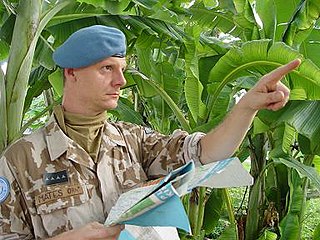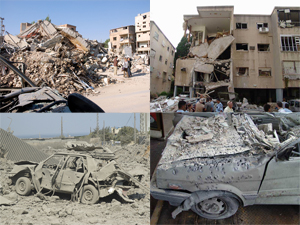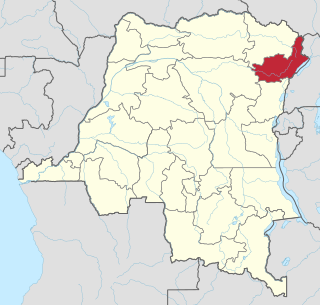
United Nations Security Council Resolution 1674, adopted unanimously on April 28, 2006, after reaffirming resolutions 1265 (1999) and 1296 (2000) concerning the protection of civilians in armed conflict and Resolution 1631 (2005) on co-operation between the United Nations and regional organisations, the Council stressed a comprehensive approach to the prevention of armed conflict and its recurrence.

United Nations Security Council resolution 1096, adopted unanimously on 30 January 1997, after reaffirming all resolutions on Georgia, particularly Resolution 1065 (1996), the Council addressed the current situation extended the mandate of the United Nations Observer Mission in Georgia (UNOMIG) until 31 July 1997.

United Nations Security Council resolution 1150, adopted unanimously on 30 January 1998, after reaffirming all resolutions on Georgia, particularly Resolution 1124 (1997), the Council extended the mandate of the United Nations Observer Mission in Georgia (UNOMIG) until 31 July 1998.

United Nations Security Council resolution 1170, adopted unanimously on 27 May 1998, after considering the situation across the African continent, the Council decided to establish an ad hoc Working Group to review the Secretary-General Kofi Annan's recommendations concerning the maintenance of international peace and security in Africa.
United Nations Security Council resolution 1181, adopted unanimously on 13 July 1998, after recalling all previous resolutions on the situation in Sierra Leone, the council established the United Nations Observer Mission in Sierra Leone (UNOMSIL) to monitor the military and security situation in the country for an initial period of six months until 13 January 1999.

United Nations Security Council resolution 1208, adopted unanimously on 19 November 1998, after recalling Resolution 1170 (1998) on Africa, the Council discussed the treatment and status of refugees on the continent.

United Nations Security Council resolution 1261, adopted unanimously on 25 August 1999, in the first resolution to address the topic, the Council condemned the targeting of children in armed conflict including the recruitment and use of child soldiers.

United Nations Security Council resolution 1270 was adopted unanimously on 22 October 1999. After recalling resolutions 1171 (1998), 1181 (1998), 1231 (1999) and 1260 (1999) on the situation in Sierra Leone and Resolution 1265 (1999) on the protection of civilians in armed conflict, resolution 1270 adopted by the Security Council established the United Nations Mission in Sierra Leone (UNAMSIL) to assist in the implementation of the Lomé Peace Accord.

United Nations Security Council resolution 1296, adopted unanimously on 19 April 2000, after recalling Resolution 1265 (1999), the Council discussed steps to enhance the protection of civilians during armed conflict.

United Nations Security Council resolution 1314 was adopted unanimously on 11 August 2000, after recalling Resolution 1261 (1999) on children and armed conflict and other resolutions including 1265 (1999), 1296 (2000) and 1306 (2000). The Council expressed concern at the impact of conflict upon children and the use of child soldiers, and expressed willingness to consider further measures under the United Nations Charter when dealing with situations of children in armed conflict.

United Nations Security Council resolution 1327, adopted unanimously on 13 November 2000, after recalling Resolution 1318 (2000) adopted at the Millennium Summit and receiving the Report of the Panel on United Nations Peacekeeping, the Council adopted a resolution concerning the improvement of its peacekeeping operations.

United Nations Security Council resolution 1341, adopted unanimously on 22 February 2001, after recalling resolutions 1234 (1999), 1258 (1999), 1265 (1999), 1273 (1999), 1279 (1999), 1291 (2000), 1296 (2000), 1304 (2000), 1323 (2000) and 1332 (2000) on situation in the Democratic Republic of the Congo, the Council demanded that all parties to the conflict in the country implement disengagement plans and adopt withdrawal plans for foreign troops by 15 May 2001.

United Nations Security Council resolution 1355, adopted unanimously on 15 June 2001, after recalling resolutions 1234 (1999), 1258 (1999), 1265 (1999), 1273 (1999), 1279 (1999), 1291 (2000), 1296 (2000), 1304 (2000), 1323 (2000), 1332 (2000) and 1341 (2001) on situation in the Democratic Republic of the Congo, the Council extended the mandate of the United Nations Mission in the Democratic Republic of Congo (MONUC) until 15 June 2002 subject to review every four months.

United Nations Security Council resolution 1366, adopted unanimously on 30 August 2001, after reaffirming resolutions 1196 (1998), 1197 (1998), 1208 (1998), 1265 (1999), 1296 (1999), 1318 (2000), 1325 (2000) and 1327 (2000) concerning aspects of armed conflict, the Council reiterated its aim to prevent armed conflict as part of its responsibility to maintain international peace and security.

United Nations Security Council resolution 1379, adopted unanimously on 20 November 2001, after recalling resolutions 1261 (1999), 1265 (1999), 1296 (2000), 1306 (2000), 1308 (2000), 1314 (2000) and 1325 (2000), the Council considered provisions to protect children during peacekeeping operations and requested the Secretary-General to identify parties to conflict that used or recruited child soldiers.

United Nations Security Council resolution 1460, adopted unanimously on 30 January 2003, after recalling resolutions 1261 (1999), 1265 (1999), 1296 (2000), 1306 (2000), 1308 (2000), 1314 (2000), 1325 (2000) and 1379 (2001), the council called for the immediate end to the use of child soldiers and endorsed an "era of application" of international norms and standards for the protection of war-affected children.

United Nations Security Council resolution 1468, adopted unanimously on 20 March 2003, after recalling previous resolutions on the situation in the Democratic Republic of the Congo, the Council welcomed an agreement on the establishment of a transitional government and requested an increased presence of the United Nations Mission in the Democratic Republic of Congo (MONUC) in the Ituri region in the east of the country amid escalating violence.

United Nations Security Council resolution 1502, adopted unanimously on 26 August 2003, after recalling resolutions 1265 (1999), 1296 (2000) and 1460 (2003), the council condemned violence against humanitarian workers and called upon all states to ensure that such incidents did not remain unpunished.

United Nations Security Council resolution 1539, adopted unanimously on 22 April 2004, after recalling resolutions 1261 (1999), 1308 (2000), 1314 (2000), 1325 (2000), 1379 (2001) and 1460 (2003), the council condemned the use of child soldiers and asked the Secretary-General to devise a monitoring mechanism.
The responsibility to protect (R2P) is a widely endorsed and developing norm aimed at preventing humanitarian atrocities. China has been receptive towards the development of R2P since its inception in 2001, despite China's traditional tendency to obstruct engagement in humanitarian crises. As veto-wielding Security Council member, important regional power, and major economic power, with interests in states experiencing, or vulnerable to, humanitarian crisis, including Nigeria, Zimbabwe, Angola and Sudan, the support of China for R2P is vital.


















